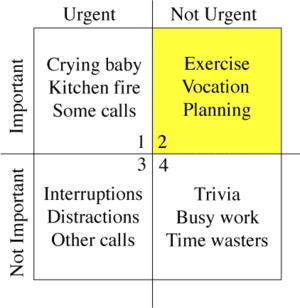The Only Thing You Need To Remember About The Seven Habits of Highly Effective People
Curated from: forbes.com
Ideas, facts & insights covering these topics:
6 ideas
·73.6K reads
160
Explore the World's Best Ideas
Join today and uncover 100+ curated journeys from 50+ topics. Unlock access to our mobile app with extensive features.
Time management matrix
At the beginning of every week, write a two-by-two matrix on a blank sheet of paper.
One side of the matrix says "urgent" and "not urgent". The other side of the matrix says "important" and "not important."
Then, write all the things you want to do that week.
4.9K
22.4K reads
Quadrant 1: Urgent-Important
These are the most pressing tasks we'll likely get to this week. When we do fire-fighting, it's all relating to stuff in this quadrant.
3.46K
13.2K reads
Quadrant 2: Not Urgent - Important
These are the things that matter in the long-term but will offer no concrete benefits right now or even this year. They are things we know we need to get to but probably will push off.
3.46K
9.39K reads
Quadrant 3: Urgent - Not Important
These tasks keep us busy today, but if we stop to really think about it, were a waste of time. These are interruptions that happen, such as phone calls.
3.43K
9.2K reads
Quadrant 4: Not Urgent - Not Important
These things are the time wasters we do because we feel like we're tired and need a break: checking and rechecking Facebook and Twitter during the day, or mindlessly eating, even though we're not hungry.
3.43K
7.08K reads
The most important quadrant
Quadrant 1 (the urgent/important tasks) you will always automatically take care off. Quadrants 3 & 4 should be eliminated to a great extent.
Quadrant 2 (not urgent but important) is what will change your life over time. At least 10% of your day needs to be devoted to this important but not urgent stuff. Ideally, you're spending 30% of every day on this.
4.14K
12.1K reads
IDEAS CURATED BY
Juan B.'s ideas are part of this journey:
Learn more about timemanagement with this collection
How to avoid email overload
How to organize your inbox
How to write effective emails
Related collections
Similar ideas
3 ideas
The 8th Habit Of Highly Effective People
forbes.com
7 ideas
7 Habits of Highly Effective People [Summary & Takeaways]
blog.hubspot.com
1 idea
Read & Learn
20x Faster
without
deepstash
with
deepstash
with
deepstash
Personalized microlearning
—
100+ Learning Journeys
—
Access to 200,000+ ideas
—
Access to the mobile app
—
Unlimited idea saving
—
—
Unlimited history
—
—
Unlimited listening to ideas
—
—
Downloading & offline access
—
—
Supercharge your mind with one idea per day
Enter your email and spend 1 minute every day to learn something new.
I agree to receive email updates

